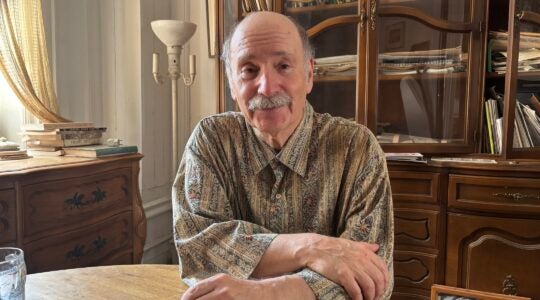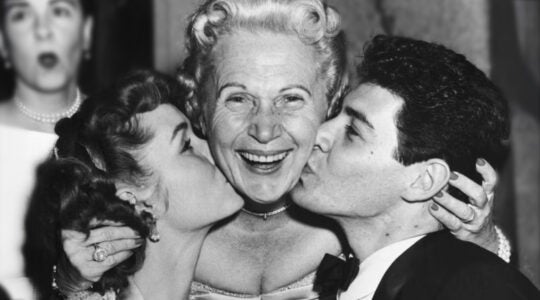The suspects charged in the Q train beating of three Jewish students celebrating Chanukah are guilty of “nothing more than acting as kids,” said Peter Mollo, the lawyer for one of them.
Mollo, whose comments drew harsh reaction from two local leaders, compared how authorities react to such behavior today and how they regarded it four decades ago, when he was a child growing up in Bay Ridge.
“We would fool around; we would fight; we would make remarks to people’s faces regarding their ethnicity,” said Mollo, 51, referring to himself and his peers in what he called a mixed neighborhood in the 1960s and ‘70s. The fights, he added, would be laced with comments about ethnicity.
But Mollo, the attorney for 19-year-old Joseph Jirovec, one of 10 suspects charged in the case, said of that behavior that “it was nothing hateful.” He also blames the different outlook on the part of society on political correctness. “That kind of thing which used to be OK — not OK, but traditional — is now a crime,” he said.
Not only a crime, Mollo might have added, but a hate crime.
Indeed, as Mollo made his comments to The Jewish Week, prosecutors in Brooklyn sought to upgrade the charges already filed in the case to hate-crime charges.
Assistant District Attorney Charles Guria told a Brooklyn judge earlier this week that he would present evidence supporting those charges to a grand jury, a spokesman for the DA’s office said. If the grand jury follows Guria’s recommendation, the suspects — originally charged with misdemeanor counts of assault, menacing and harassment — would face felony charges instead, all with increased penalties.
In addition, authorities are certain to “revisit” the cases against Jirovec and another suspect — Kimberly Babajko, 19, of Brooklyn — for past crimes they committed, according to a law-enforcement source. Jirovec has pleaded guilty to his role in a 2006 assault against four black teenagers in Gerretsen Beach, Brooklyn. Jirovec is scheduled to begin his sentence — six months in jail and five years on probation — on Jan. 9, but, if convicted of the subway attack, he may be sentenced instead to as much as two-and-a-half to seven years in jail, the maximum penalty attached to his plea.
Babajko, arrested in September as part of a group that attacked two employees of a livery car service in Brooklyn, received an adjournment in contemplation of dismissal. That means that if Babajko stayed out of trouble for six months, the charges against her would be dismissed. But Babajko is once again in trouble.
The subway attack took place Dec. 9 after two Jewish college students — Walter Adler, 23, and Maria Parsheva, 20, his girlfriend — entered a Brooklyn-bound Q train in Lower Manhattan with two friends, Angelica Krischanovich, 21, and Nick Rosenbaum, 23. Adler wished other passengers on the train “happy Chanukah,” drawing the attention of the suspects, some of whom shouted “you dirty Jews,” “you f—ing Jews” and “the Jews killed Jesus on Chanukah,” he said. Four suspects pounced on Adler, while two other suspects, both young women, hit Krischanovich, he recalled.
The only passenger to step forward and help the students was Hassan Askari, 20, a Bengladeshi Muslim, who, as a result, was also beaten, the police said.
That entire account is disputed by Mollo, who spoke of “a rush to judgment in this case.” His client and other suspects “have another story,” he said, one that involves “kids on the other side” — Adler, Parsheva and their friends — insulting them and initiating the conflict. Jirovec also claims that Adler called one of his friends, the only black suspect in the case, “the ‘N’ word” and that a pocketknife Parsheva says she saw belonged to her group of friends rather than his.
Adler, responding to those claims, told The Jewish Week that he would never utter anything racist, and that part of his political science concentration at Hunter College involves black studies. “It’s crazy and offensive that this stuff is being attributed to me,” he said.
Adler also disputes Jirovec’s claim that he was drunk, saying he hasn’t touched liquor in two years. In a separate interview, Parsheva said she and her friends weren’t rude but tried to reason with the suspects: “We were just trying to explain to them why it’s perfectly normal in New York to say ‘happy Chanukah’ to anyone.”
As for a pocketknife, police never found one.
A prominent Jewish leader who, because of his close working relationship with law-enforcement officials, declined to be quoted by name, said “The witnesses in the subway car are going to be critical,” he said. “They’re going to have more credibility than the people who are involved.”
One legal expert, Julie Goldscheid of the City University of New York School of Law in Queens, agreed, saying that hate is a difficult thing to prove. “What a jury will look at is circumstantial evidence,” such as the epithets shouted during the crime’s commission, and eyewitness testimony will be important in that regard.
Under New York’s hate-crime law, passed in 2000, “hate crime isn’t a charge itself,” said another professor, Ian Weinstein of Fordham Law School. “It’s an enhancement if someone is [already] charged with various crimes,” such as assault, making those counts more serious. A jury hearing a hate-crime case can convict a defendant either on the enhanced charges or the original, unenhanced charges, Weinstein added.
The concept behind hate-crime laws is that a swastika spray-painted on a synagogue is far worse than graffiti painted on a bus because the impact on society is greater, said Steven Freeman, associate director of civil rights at the Anti-Defamation League. The crime is viewed as an attack against the entire community, polarizing its members and making others feel vulnerable, rather than just the individual victim.
The question of whether the perpetrators of a hate crime have to hate their victim’s particular group may be germane to the Q train case, especially after two suspects claimed Jewish parentage. Jirovec’s late mother was Jewish, Mollo said, adding that his client has celebrated both Chanukah and Christmas. Similarly, Zachary Rogalski, 19, of Brooklyn also claims Jewish parentage.
But the real issue, said Freeman, is whether the suspect in a hate-crime case selected his victim because of his background. “It doesn’t really matter who he’s married to, or who his friends are, or whether he himself is Jewish,” Freeman continued.
Joel Levy, ADL’s regional director, and Assemblyman Dov Hikind (D-Brooklyn) both responded to comments made by Mollo’s lawyer. Levy said his father used to get beaten up as a child in Brooklyn “many times” because he was Jewish, “but I don’t want my children or grandchildren to be the victims.. … To say that kids can get into fights because kids used to get into fights is absurd.”
Hikind called Mollo’s comments “outrageous,” suggesting that a lawyer who makes such comments should be disbarred. “In the first place,” he noted, the suspects arrested in the case are adults, not children. But beyond that, Mollo appears to be making light of a serious act, he said. “Kids who draw swastikas or say anti-Semitic things grow into adults who do far worse.”
The New York Jewish Week brings you the stories behind the headlines, keeping you connected to Jewish life in New York. Help sustain the reporting you trust by donating today.




